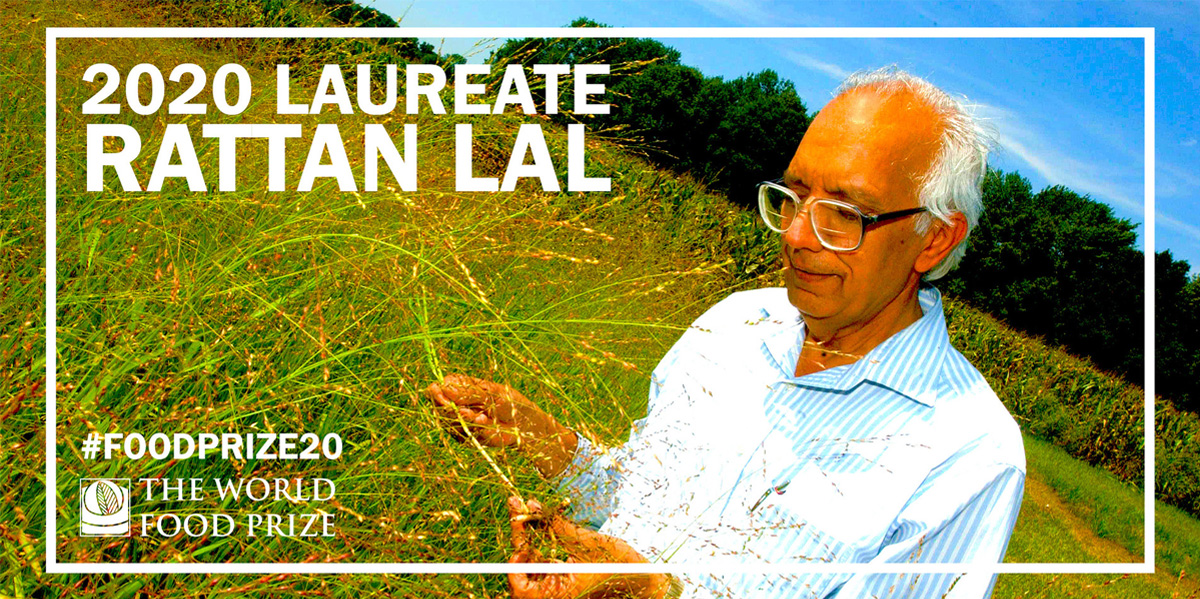
Soil Health Trailblazer is 2020 World Food Prize Laureate
June 17, 2020| |
Leading soil scientist Dr. Rattan Lal is the 2020 World Food Prize Laureate for his work in developing and mainstreaming a soil-centric approach to increasing food production that conserves natural resources and mitigates climate change. The 2020 Laureate Announcement Ceremony featured pre-recorded remarks from the U.S. Secretary of State Michael R. Pompeo and U.S. Secretary of Agriculture Sonny Perdue, together with World Food Prize Foundation President Barbara Stinson announcing the name of the Laureate, who also called Dr. Lal "a trailblazer in soil science."
During the Announcement Ceremony, Secretary Pompeo said Dr. Lal's research in soil science has helped the earth's estimated 500 million small farmers in becoming faithful stewards of their land through improved management, less soil degradation, and the recycling of nutrients. Billions of people who depend on these farms stand to benefit greatly from Dr. Lal's work.
From his humble beginnings as a refugee growing up on a small subsistence farm in India, Dr. Lal's determination to learn and succeed in school propelled him to become one of the world's foremost soil scientists. His pioneering research on the restoration of soil health in Africa, Asia, and Latin America led to revelations that impacted agricultural yields, natural resource conservation, and climate change mitigation. The agricultural practices he advocated are now at the heart of efforts to improve agriculture systems in the tropics and globally.
Dr. Lal began his research career at the International Institute of Tropical Agriculture in Nigeria, developing soil health restoration projects across Asia, Africa, and Latin America. In 1987, he returned to his alma mater, The Ohio State University, where his research showed how atmospheric carbon can be sequestered in soils. This breakthrough research transformed the way the world saw soils. Three separate United Nations Climate Change Conferences adopted his strategy of restoring soil health as a means to sequestering carbon. In 2007, he was among those recognized with a Nobel Peace Prize Certificate for his contributions to the Intergovernmental Panel on Climate Change (IPCC) reports, when the IPCC was named co-recipient of the Nobel Prize.
For more details about the 2020 Laureate, visit the World Food Prize website.
| |
You might also like:
- Vegetable Breeder Simon Groot is the 2019 World Food Prize Laureate
- Adesina Wins 2017 World Food Prize
- 2016 World Food Prize Given to Pioneers of Biofortification
Biotech Updates is a weekly newsletter of ISAAA, a not-for-profit organization. It is distributed for free to over 22,000 subscribers worldwide to inform them about the key developments in biosciences, especially in biotechnology. Your support will help us in our mission to feed the world with knowledge. You can help by donating as little as $10.
-
See more articles:
-
News from Around the World
- Soil Health Trailblazer is 2020 World Food Prize Laureate
- Genome Editing 101: Healthcare and Industrial Applications and Regulations
- Australian OGTR Authorizes Clinical Trial of GM Influenza Vaccine
- World Experts Release Roadmap for Next Generation Crops
-
Research Highlights
- Israeli Scientists Discover Possibilities of Plant-Sustained Electricity
- Study Reveals Transgenic Goats Can be Used to Produce Antibodies Against Cancer
- OsCpn60β1 Vital for Chloroplast Development in Rice, Study
-
Plant
- High-Efficiency Reduction of Rice Amylose Content via CRISPR-Cas9-Mediated Base Editing
- New Protocol: Genome Editing Using Rice Zygotes
-
Health
- Scientists Find Super-potent Human Antibodies from Recovered COVID-19 Patients
-
Read the latest: - Biotech Updates (January 14, 2026)
- Gene Editing Supplement (December 17, 2025)
- Gene Drive Supplement (February 22, 2023)
-
Subscribe to BU: - Share
- Tweet

